Children who struggle with self-esteem issues often have very negative patterns of talking to themselves. You will often hear a child with low self-esteem say things like, “I’m stupid” or “I can’t do anything right.”
In a sense, when a child is habitually saying mean things to themselves, they are affirming their negative traits. In other words, the more often they say or think something negative about themselves, the more they believe it is true.
The good news is that positive affirmations can have a similar effect on kids. Using self-esteem focused positive affirmations will help kids start to believe that they are capable, courageous, or whatever other positive quality you want to focus on.
This post may contain affiliate links.
What are Affirmations for Self Esteem
Self Esteem Affirmations for kids are words or short statements that you say regularly (and sometimes over-and-over) to help retrain and/or refocus your brain. They can be used to disrupt negative thought patterns, to help gain confidence, and to address difficult emotions among other things.
How to Use Affirmations with Kids
You can start using affirmations in all sorts of different ways. Here are some of my favorite ways to use affirmations:
- hanging posters or printed out papers with the affirmation artfully arranged in their bedroom, playroom, and anywhere else they spend time.
- Using window markers to write on their bathroom mirror
- Using a deck of affirmation cards. (Draw one daily and encourage your child to repeat it to themselves throughout the day.)
- Placing handwritten affirmations in their school lunchbox
- Use pre-printed lunchbox affirmation notes.
- Buying t-shirts with positive saying on them
- Making a poster together with their favorite affirmation that they write and color and choose where to hang. (Check out this fun DIY Affirmation Kit that will teach kids how to write their own as well as give them poster templates to make affirmation signs.)
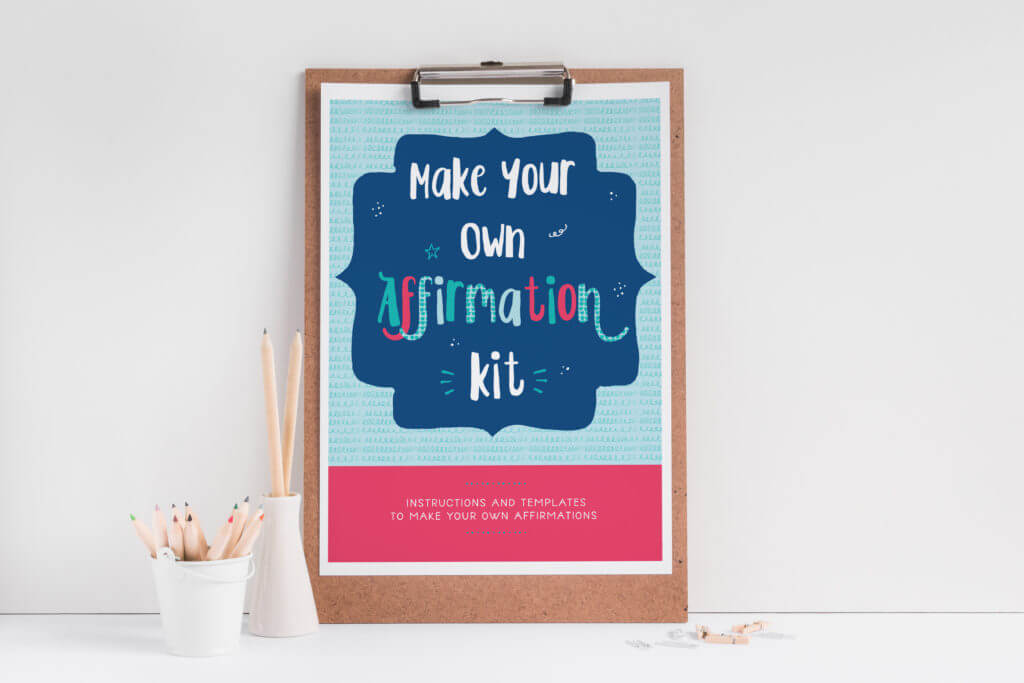
20 Positive Affirmations to Boost Kids Self-Esteem
Here are 20 affirmations to get you started. Feel free to make up your own or work with your child on creating one that resonates with them.
- I am strong
- I am brave
- I am enough
- I get better every day
- I am a great problem solver
- I am perfect just the way I am
- I am special
- I am smart
- I am a fun and likable person
- I like myself
- I can control my thoughts and emotions
- I can do hard things
- I do my best in school
- My family and friends love me for who I am
- I can do it
- I like myself
- I can do anything I put my mind to
- I believe in myself
- It is enough to do my best
- I am beautiful inside and out
How to create your own Affirmation with Your Child
Creating a personal affirmation with your child can be a powerful exercise. Here are 3 steps to guide you in creating an affirmation that targets your child’s specific self-esteem issues.
Step 1: Discuss the underlying emotions.
For example, if you hear your child saying, “I’m so stupid” often, talk about why they feel that way. Maybe they are struggling in school because they don’t understand something and are afraid to ask. Or, maybe they tend to want to be very perfectionistic and are afraid of failure.
One good way to work through this is with the Brave Guide to Self Esteem
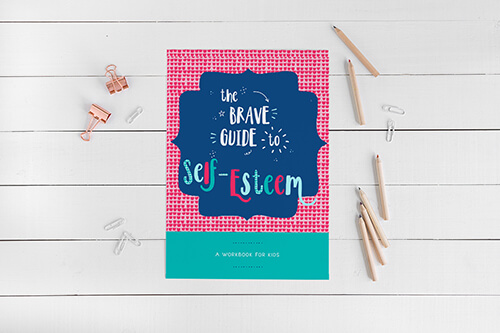
Step 2: Brainstorm words and sayings that speak to your child’s underlying fear or emotion.
For example, an affirmation for a child who is afraid of failure could be, “Mistakes are just a step to finding the solution.”
Or an affirmation for a child who is afraid to ask for help could be, “It is safe for me to ask for help.”
Finding affirmations that relate to the underlying fear will be much more powerful than an affirmation such as, “I am smart.”
Step 3: Decide how you will use this Affirmation.
Make a plan that it simple and easy to follow. Pick 2 or 3 places or routines where you can incorporate the Affirmation. For example, make a poster using the Affirmations Kit for Kids and hang it in their room.
Or, you could plan to say the affirmation before each meal or at bedtime. You could also have your child write the affirmation on their bathroom mirror or use one of the mini affirmation sign templates from the Affirmation Kit for Kids for the mirror.
Using Self-Esteem Affirmations for Kids
Using positive affirmations can make a huge difference in a child’s self-esteem. There are many ideas for affirmations that you can use right away. Or, for an even more personalized approach, create a positive affirmation that directly targets your child’s issues.
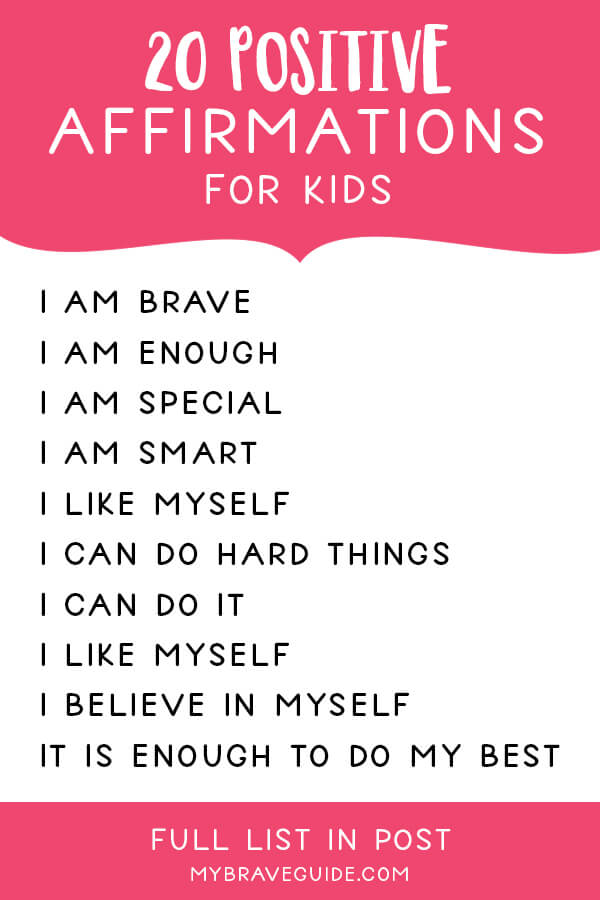
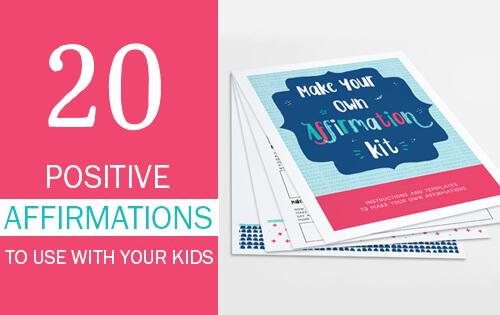
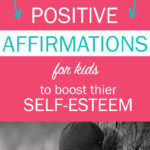
Thank you for your inspiring, creative and thoughtful post. I am a “Mimi” of 7 brilliant and precious grandchildren. (of course, I would say such a thing) Five of my darlings (4 boys and 1 girl) are preparing to begin a new school year of online learning and all of them are dealing with disappointments (school without daily socializing with friends, loss of their favorite before and after school activities, athletics, cheerleading, choir practice, band practice, school assemblies, the list is endless). Our daughter and son-in-law and our son and daughter-in-law are experiencing anticipatory anxiety; I don’t know what I would have done had I been in their shoes when I was a stay at home mother. I have been searching for any and every creative resource, project, teaching aid and activity I can provide for their home classrooms, daily practices, creative outlets to help add some spice to their days as well as encourage them to acknowledge that while they are doing a “hard thing”, they are succeeding and performing exceptionally well. I’m hoping to provide their parents with some relief and positive thinking, too. My husband and I have the privilege of caring for and loving on the two “not ready for school littles”, ages 14 months and 2.5 years old while their parents are teaching. I’m delighted to have serendipitously stumbled upon your blog; I look forward to browsing further, I have found the help I need via your creative thoughts and wisdom. As a former English teacher, I’ve always held fast to the importance of personally acknowledging and feeding the unique creative spirit I find in each child, tween, teen and adult I encounter; flowers without water cannot continue to blossom.